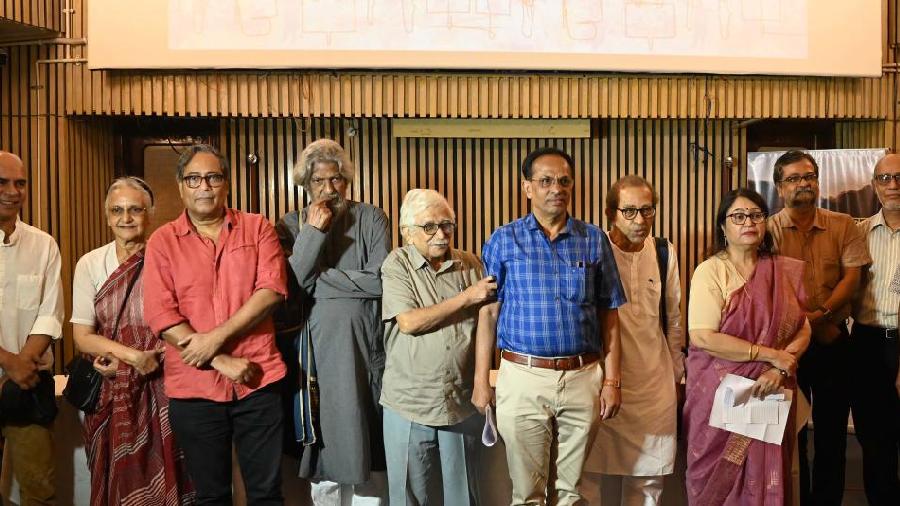The respect that Amartya Sen commands and the weight that his opinion carries are the real targets of an organised attempt to malign him, several speakers said at a meeting to protest the harassment of the Nobel laureate at the hands of Visva-Bharati.
The saffron regime has its eyes on Sen because he can influence the opinion of the thinking class, they said.
“Amartya Sen is not the ultimate target. The real target is the respect that he gets. People revere Sen. That reverence is the target. By targeting Sen, they want to target dissent,” said Anil Acharya, author.
Acharya was among several speakers at a meeting organised by Samajik Marjada Raksha Samity at a Nandan auditorium on Thursday evening.
“In Santiniketan, built with Tagore’s dreams, people are going totally against his ideals. The arrogance of power and muscle flexing of institutional power has endangered the future of Viva-Bharati. We would not comment on the legal formalities surrounding a piece of land. However, it is another debate if the so-called impartiality of the legal process is maintained in the face of vitriolic and distasteful verbal attacks on one of the most eminent citizens of this country,” retired bureaucrat and author Anita Agnihotri, one of the conveners of the meeting, said at the outset.
Achin Chakraborty, professor of economics, was the other convener.
The participants included academics, stage veterans, doctors, scientists and other members of the civil society.
The meeting started around 5pm, around the time the strongest thunderstorm so far this season struck Kolkata.
Physicist Bikash Sinha could not make it to the auditorium in person because of the weather, but had his message read out.
“When Gurudev was building Visva-Bharati in Santiniketan, he had nothing to offer except the vast landscape of tranquil beauty. So, Gurudev insisted on giving away land to distinguished teachers to come and live in Santiniketan. In a few words, Santiniketan was heavenly to live in and teach at.… Decimals to measure land, at that time, was not of contemporary vocabulary. To have a petty battle against such a great man is absurd…. Slowly and surely, deterioration has set in the standards. For entirely selfish reasons, it seems that Visva-Bharati has already gone nowhere from the glorious early days…. It has only become a troubled spot,” said Sinha’s message.
Visva-Bharati has asked Sen to return 13 decimals of land which, according to them, is under his “unauthorised” occupation. On April 19, the central university had threatened to evict the economist from the 13 decimals if he did not vacate the land by May 6.
Chief minister Mamata Banerjee had met the economist in Santiniketan in January and handed him land documents that she said showed that the entire 138 decimals, including the 13 decimals that Visva-Bharati says are under Sen’s “unauthorised” occupation, belonged to the Sen family.
Even after the rights to the entire 138 decimals were recorded in Sen’s name by the state land department, Visva-Bharati initiated a legal process to evict him from the 13-decimal section. On April 19, it issued the eviction order.
The court of the executive magistrate of Bolpur has ordered status quo on the plot, but a source said Visva-Bharati was considering moving a higher court against the injunction.
On Thursday, multiple speakers pointed to a larger design behind the Sen controversy.
“I don’t think land is the focal point. Because any land-related issue will be resolved in court. To me, this is a direct political issue,” said Sourin Bhattacharya, a former professor of economics at Jadavpur University and a former student of Sen.
Sen’s critical stand on several socio-political issues like demonetisation, GST, Article 370, CAA and NRC led to his targeting, he said.
Theatre veteran Rudraprasad Sengupta; Amiya Dev, former professor of comparative literature at Jadavpur University; and gastroenterologist Abhijit Chowdhury, who was at the forefront of Bengal’s Covid-19 management team, were among the participants.
